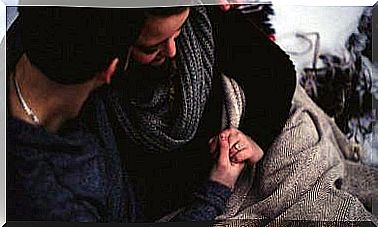Ecolocation, The Sixth Sense Of The Human Being?

Ben Underwood is one of the few known cases of echolocation and perhaps the most illustrative and documented of them all. By knowing its history, we also discover what this interesting concept, which some call “the sixth sense of the human being” means.
When Ben Underwood was born, he looked like a completely normal baby. The only thing her mother noticed was an unusually intense gleam in one of her eyes, but she didn’t think that was a cause for concern. However, the boy grew up and, at age 2, was diagnosed with retinal cancer, one of the rarest.
The doctors did everything they could to help him, and so he had chemotherapy and radiotherapy sessions, but without success. In the end, both eyes had to be removed to save his life. He was only 3 years old when he stopped seeing.
Ben Underwood and echolocation
Ben Underwood’s life changed completely, and he underwent training to be able to orient himself without his sight. The mother accompanied him in this process, making important advances. What no one expected is that, without any kind of guidance or instruction, Ben would develop a method for “seeing with the ear”: echolocation.
What this boy did was click his tongue. The sound he produced hit the objects and then he knew they were there. His hearing had developed remarkably and, over time, he was not only able to avoid the objects, but also to know what they were made of.
Echolocation is just that, a mechanism by which space and its components are identified by means of sound waves. This mechanism is part of the biological equipment of bats and cetaceans, but it is rarely detected in humans.
see with the ears
Echolocation works because sound waves behave one way or another based on whether they find objects or not. We could say, simplifying a lot and being imprecise, that the wave bounces when it encounters a physical obstacle, and can be picked up by very sensitive ears.
Thus, the person with echolocation can know the place that the object occupies. In cases like Ben Underwood’s, this skill reaches extraordinary levels.
Ben became a skilled surfer, basketball player and martial arts fighter. He had no shortcomings in these fields compared to those who could see. Unfortunately, the cancer returned and this time he was unable to overcome it, passing away in 2009.
While this case is one of the best known, it’s not the only one we hear about. In fact, the first reports of blind people orienting themselves with this type of “radar” or “sonar” date back to 1749. At that time, this was considered a rarity, and has not been scientifically studied in depth.
Investigation into echolocation only began in the 1940s. The Cornell Psychology Laboratory conducted a series of experiments and found that each sound generated a slight pressure on the skin. This is the basis of this incredible skill.
a human skill
Echolocation is an innate human skill that not all blind people develop because they have not been trained to do so. However, anyone can acquire this skill with the necessary work. Everything indicates that sounds are capable of stimulating the brain’s primary visual cortex, and that’s what makes it possible to locate objects without seeing them.
Science has not fully unraveled this phenomenon, mainly because sighted people have also developed this ability. In these cases, the primary visual cortex is not stimulated as it is in the blind, which means that other areas of the brain that have not yet been localized are involved.
There are other famous cases of echolocation, such as Daniel Kish, who dedicated his life to developing this skill in the blind through a foundation called World Access for the Blind . It ensures that you can not only notice the presence of objects, but you can also tell if they are beautiful or not.
Although many details of this fabulous ability are not yet known, what is clear is that the human brain does not cease to amaze us. Every day we know more about this organ, but of course there are still many wonders to be discovered.









